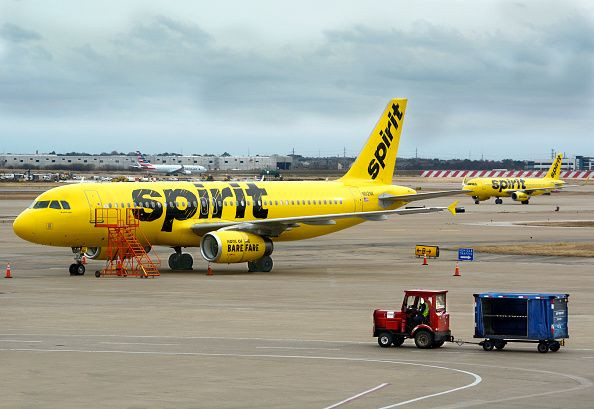Spirit Airlines Is Soaring Above Airline Turbulence

In recent months, there has been a sharp divergence in performance among U.S. airlines. Those with more of a business travel focus have experienced a noteworthy slowdown in unit revenue growth. Meanwhile, unit revenue trends have stayed strong -- and even improved -- at leisure-oriented airlines.
Spirit Airlines (NYSE:SAVE) definitely falls into the latter camp. And after many false starts over the past few years, the carrier's revenue per available seat mile (RASM) is suddenly surging again, driving a swift change in its earnings momentum.
A change for the better
During the first half of 2018, Spirit Airlines' RASM declined 4.6%. At the same time, the carrier's average per-gallon fuel price skyrocketed by 31%, more than offsetting a sharp decrease in its nonfuel unit costs. As a result, Spirit Airlines posted an adjusted pre-tax margin of 8.9%, down from 14% a year earlier.
By contrast, RASM returned to growth in Q3, increasing 5.5% year over year. That was enough to offset an even more dramatic jump in its fuel costs. This allowed Spirit to achieve a 14.5% adjusted pre-tax margin in the quarter, down just slightly from 15% in the prior-year period.
Entering the fourth quarter, Spirit's guidance was more mixed. RASM was expected to stay strong, rising about 6%. However, management projected that nonfuel unit costs would increase 5% to 6%, due to the timing of certain expenses, and that fuel prices would jump by 25% as well.
This forecast implied that Spirit's pre-tax margin would decline to around 8% in the fourth quarter from 12% in Q4 2017. On the bright side, the carrier's unit revenue momentum put it in good position to return to earnings growth in 2019 -- barring another big spike in fuel prices.
Everything gets better
In late November, Spirit Airlines revealed that business was improving faster than expected. The airline boosted its RASM growth forecast all the way to 11%. Spirit also reduced its fuel cost estimate to $2.27 per gallon (from $2.46 per gallon previously), due to a sharp drop in oil prices. It even modestly improved its nonfuel unit cost guidance.
The result was that analysts' Q4 earnings-per-share estimates quickly surged from $0.71 to $1.31. Yet the good news wasn't over.
Last week, Spirit Airlines bumped up its unit revenue forecast again. It now expects to report an 11.4% RASM increase for the fourth quarter. It also reduced its fuel cost estimate by $0.01 per gallon. The only negative is that nonfuel unit costs rose about 5.5% -- at the high end of Spirit's November guidance range.
Based on the details of the updated outlook, Spirit Airlines' revenue likely reached $863 million last quarter, comfortably above the average analyst estimate. Adjusted EPS will come in at roughly $1.38, above the recent analyst consensus of $1.35 -- and more than twice what analysts expected at the beginning of October.
Spirit Airlines stock could have plenty of room to run
Shares of Spirit Airlines have surged about 20% in the past three months. Yet the stock is still quite cheap, trading for less than 10 times forward earnings. Furthermore, analysts may be underestimating Spirit's earnings power for 2019 and beyond.
In contrast to 2018, Spirit Airlines is currently on pace to pay a little less for jet fuel this year. The volatility of the oil market means that could change in a hurry, but at least the carrier doesn't seem likely to face another huge year-over-year increase in its fuel bill.
Moreover, Spirit Airlines' unit revenue momentum is real and should continue into 2019. Recent moves to diversify its route network and grow non-ticket revenue are just starting to bear fruit. The carrier also is starting to improve its reputation, thanks to its investments in customer service and its efforts to operate more reliably.
This is not to say that Spirit will achieve double-digit RASM growth this year. But even a 5% unit revenue gain could send EPS skyrocketing to more than $7 for the full year. With that kind of earnings potential, Spirit Airlines stock has tons of upside remaining.
This article originally appeared in The Motley Fool.
Adam Levine-Weinberg is a senior Industrials Consumer Goods specialist with The Motley Fool. Adam Levine-Weinberg owns shares of Spirit Airlines. The Motley Fool owns shares of Spirit Airlines. The Motley Fool has a disclosure policy.





















